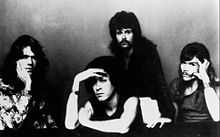Sugarloaf (band)
| Sugarloaf | |
|---|---|
 The band in 1974. | |
| Background information | |
| Origin | Denver, Colorado, United States |
| Genres | Rock, Psychedelic rock |
| Years active | 1970–1975 |
| Labels |
Liberty Records Polydor Records Claridge Records |
| Past members |
Jerry Corbetta Bob Webber Bob Raymond Bob MacVittie Jay Thomms Veeder Van Dorn (1970) Bob Yeazel (1973) Myron Pollock Bobby Pickett (1972). |
Sugarloaf was an American rock band in the 1970s, featuring lead vocalist and keyboardist Jerry Corbetta. They originated in Denver, Colorado.
Corbetta founded the band with guitarist Bob Webber of the Moonrakers; the other initial bandmembers were drummer Bob MacVittie and rhythm guitarist Veeder Van Dorn III, also from the Moonrakers, plus bassist Bob Raymond.[1] The Moonrakers had previously released 4 singles on Tower;[2] three of their songs are collected on the Colorado garage rock compilation album Highs in the Mid-Sixties, Volume 18, and another was released earlier on the Pebbles Volume 10 LP.
The band was originally known as Chocolate Hair. They changed their name to Sugarloaf, a mountain outside of Boulder, Colorado,[3] when they received their first recording contract.
They are best known for two songs, both of which hit the top 10 charts in the United States: "Green-Eyed Lady" in the autumn of 1970 (their biggest hit, reaching No. 3 on the Billboard chart) and "Don't Call Us, We'll Call You" in 1975 (US No. 9).
Other songs which charted on the Billboard Hot 100 were "Mother Nature's Wine" (1971), "Tongue in Cheek" (1971), and "Stars In Our Eyes" (1976). In addition, "West of Tomorrow" and "Myra Myra" were not hit singles, but received modest airplay at the time of their release on album rock radio stations.
The 1975 album Don't Call Us, We'll Call You was a re-release of their 1973 album I Got A Song, with one of the tracks on the earlier album replaced by the title track of the later album, which had become a hit single.
The song "Don't Call Us, We'll Call You" is notable because it contained a practical joke at the expense of CBS Records, which had just turned them down for a recording contract. The song includes the sound of a touch-tone telephone number being dialed near the beginning and ending of the song. Those numbers were an unlisted phone number at CBS Records and a public number at the White House respectively. In addition, the recording includes snippets of the guitar riff of The Beatles' "I Feel Fine," Stevie Wonder's "Superstition," and a line of dialogue from Wolfman Jack stating the call sign of a radio station; numerous tracks of this line were cut to match local markets.
Corbetta later went on to perform with the group Disco-Tex and the Sex-O-Lettes (best known for their hit "Get Dancin'"). In 1980, he became a member of The Four Seasons. He currently performs with The Classic Rock All-Stars, a touring supergroup of hitmakers from the 1960s and 1970s. Bobby Pickett later went to perform with Etta James, Gregg Allman, the rock group Detective, and currently the bassist for Blues group, Cafe R&B.
Discography
Albums
- Sugarloaf (Liberty Records, 1970) US No. 24
- Spaceship Earth (Liberty Records, 1971) US No. 111
- I Got A Song (Brut Records, 1973)
- Don't Call Us, We'll Call You (Claridge Records, 1975) US No. 152
Singles
- "Green-Eyed Lady" (1970) US No. 3
- "Tongue In Cheek" (1971) US No. 55
- "So Much Hate" (1971)
- "Mother Natures Wine" (1971) US No. 88
- "Put The Sugar on the Loaf" (1971)
- "Don't Call Us, We'll Call You" (1974) US No. 9
- "Hablajeedadon Akim" (1974)
- "Stars In My Eyes" (1975) US No. 87
- "The Hammer" (1975)
- "Take the Fruit" (1975)
- "IDEALPAL" (1975)
- "Trey Jay" (1975)
- "Hill Bill" (1975)
References
- ↑ allmusic entry on Sugarloaf. Retrieved 6 May 2011.
- ↑ Liner notes on Highs in the Mid-Sixties, Volume 18. Retrieved 6 May 2011.
- ↑ map
External links
- Former member Bob Yeazel's web site with Sugarloaf photos & band history
- Classic Rock All Stars (Jerry Corbetta) *http://www.bobbypickett.net